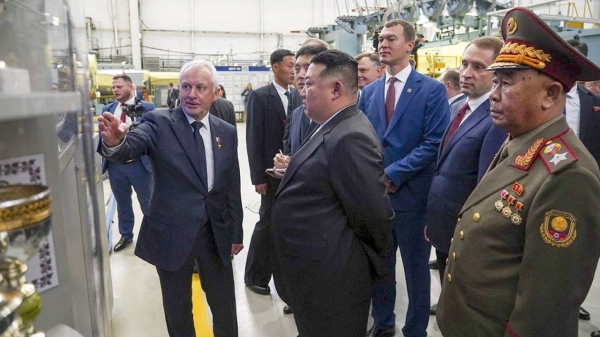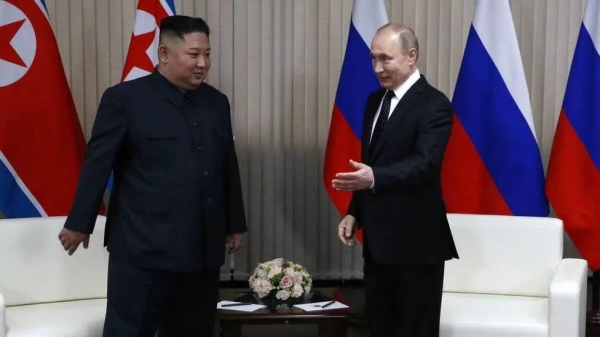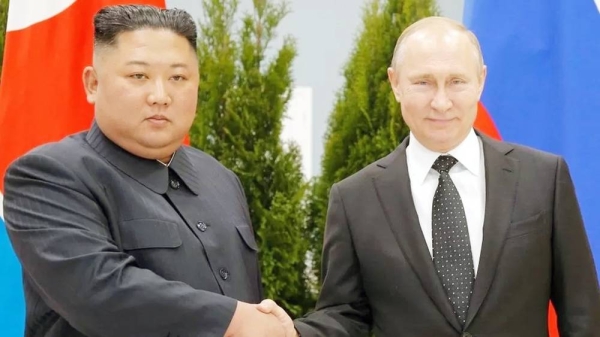
The Kremlin confirmed on Monday that preparations are underway for a historic first summit between Vladimir Putin and Kim Jong Un. With the meeting potentially taking place as soon as next week, the key question is whether Russia can help unlock the stalled nuclear talks between Washington and Pyongyang.
Following the early finish of the Donald Trump-Kim summit in Vietnam in February, this looks a big ask. In Hanoi, there were clear and significant differences between the two sides over the scope and pace of denuclearization and sanctions rollback, with uncertainty about whether the diplomatic process will collapse or continue growing.
It is into this potential negotiating “black hole” that Putin is now treading. Moreover, there are also shifting sands after Pyongyang on Thursday confirmed the test firing of a new “tactical guided weapon” with a “powerful warhead,” the first such test since the Trump-Kim talks process began last year.
To be sure, there are historical precedents for such high-profile negotiations to fall down and then recover, including the US-Soviet talks between Ronald Reagan and Mikhail Gorbachev in 1986 and 1987. However, it appears the gaps between Trump and Kim remain substantial, and the North Koreans have asserted, post-Vietnam, that they will not change their position and have also disputed Trump’s account that the reason the talks collapsed was that Pyongyang asked for full sanctions rollback.
One of the key reasons Putin may find it hard to move Pyongyang far or fast on its positions is that, to date at least, it is Kim — rather than Trump — who has emerged as the bigger winner from the engagement process. So far, the young leader has made few concrete concessions to the US.
At the same time, the US president has already given a significant amount away, such as calling off joint military exercises between US and South Korean forces; exchanging effusive letters of praise with Kim; holding out the prospect of an easing of sanctions on Pyongyang if it does “something meaningful” on denuclearization; saying that he is in no rush to conclude the negotiation process; and already saying that he hopes to meet again with the North Korean leader after VietnThis underlines how much Kim has already received from Trump in exchange for the ambiguous pledges in the Singapore agreement. And this in a context where there is reported evidence that North Korea is continuing uranium enrichment and has stepped up missile production.
On a personal level, for instance, the previously isolated young leader has assumed a significantly higher profile on the international stage. This was highlighted in Kim’s multi-day tour of Vietnam — his fourth foreign destination in less than 12 months after not leaving his nation’s borders for more than six years.
So why does Putin want to get involved and why does he think he can make a difference? The simple answer is that he recognizes the flux in the geopolitical chessboard, with significant new opportunities possibly opening up.
While China has played a key role in facilitating this process, Russia also perceives itself to have major interests in the Korean Peninsula. Moscow and several other major powers with a stake in the future of the area, including Japan, have therefore all been jockeying for position.
Russian Foreign Minister Sergey Lavrov met Kim last year in Pyongyang, and South Korean President Moon Jae-in met with Putin in Moscow in June. The latter was the first state visit by a sitting South Korean president to Russia since 1999.
Putin’s session with Moon underlines Russia’s interests in the historic change that could now be “in the air” on the peninsula. For instance, Moon is promoting a “New Northern Policy” that, alongside peace talks with Kim, is a foreign relations policy driver under which his administration is seeking to improve ties with key Eurasian neighbors.
As part of these discussions to strengthen bilateral cooperation, the two leaders explored potential options that may come from the decision of Kim and Moon to link roads and railways along the western and eastern corridors of the Korean Peninsula. In the coming years, these transport networks would be extended to China and Russia, opening up new opportunities into these frontiers.
It is in this context that Putin will endeavor to coax Kim back to the negotiating table, albeit on terms that favor Moscow’s interests as much as possible. Russia, like its ally China, knows that the security problems on the peninsula have no easy resolution, and both grappled in 2017 with how best to respond to the regular missile launches by Pyongyang, and also its nuclear tests.
Previously, both Moscow and Beijing had been very concerned that the tensions on the peninsula could spiral out of control with the ever-mercurial Trump, and had indicated support for a UN Security Council initiative. That UN measure would have required the US and South Korea to halt military drills, as Trump has now committed to, and the deployment of the controversial Terminal High Altitude Area Defense missile system.
Taken overall, the potential Putin-Kim summit and the wider grand diplomacy regarding North Korea underline that the geopolitical tectonic plates are still moving on the peninsula, despite the Vietnam summit collapse. With historic change still potentially in the air, Putin is keen to steer this in a pro-Russia direction, and avoid the downsides that might occur if the North-South dialogue ultimately proves to be a mirage..












